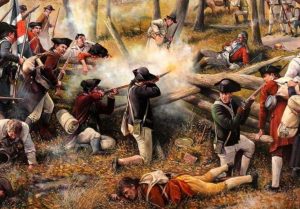 The American Revolution was a serious embarrassment to Britain, and especially to King George III. The king had to admit that things weren’t going well in the colonies…at least not where Britain was concerned. By now, the colonists had signed the Declaration of Independence that summer, and they were not going to be moved from achieving their goal to be a sovereign nation.
The American Revolution was a serious embarrassment to Britain, and especially to King George III. The king had to admit that things weren’t going well in the colonies…at least not where Britain was concerned. By now, the colonists had signed the Declaration of Independence that summer, and they were not going to be moved from achieving their goal to be a sovereign nation.
On this day, October 31, 1776, the king give a speech to the British Parliament, telling them about the signing of the United States Declaration of Independence and the revolutionary leaders who signed it, saying, “for daring and desperate is the spirit of those leaders, whose object has always been dominion and power, that they have now openly renounced all allegiance to the crown, and all political connection with this country.” I’m sure he felt that the colonists were rebels, who were not worth wasting time on by now, and he  hoped he could walk away from them without losing face any more than he already had. The British never intended for the United States to be anything more than the colones. The king went on to inform Parliament of the successful British victory over General George Washington and the Continental Army at the Battle of Long Island on August 27, 1776, but warned them that, “notwithstanding the fair prospect, it was necessary to prepare for another campaign.” Somehow, the king had the idea that there was still hope to keep the colonies.
hoped he could walk away from them without losing face any more than he already had. The British never intended for the United States to be anything more than the colones. The king went on to inform Parliament of the successful British victory over General George Washington and the Continental Army at the Battle of Long Island on August 27, 1776, but warned them that, “notwithstanding the fair prospect, it was necessary to prepare for another campaign.” Somehow, the king had the idea that there was still hope to keep the colonies.
Despite George III’s harsh words, General William Howe and his brother, Admiral Richard Howe, still hoped to convince the Americans to rejoin the British empire in the wake of the colonists’ humiliating defeat at the Battle of Long Island. They hoped to do  thing peacefully, but that was just not to be. The British could easily have prevented Washington’s retreat from Long Island and captured most of the Patriot officer corps, including the commander in chief. However, instead of forcing the former colonies into submission by executing Washington and his officers as traitors, the Howe brothers let them go with the hope of swaying Patriot opinion towards a return to the mother country. The Howe brothers’ attempts at negotiation failed, and the War for Independence dragged on for another four years, until the formal surrender of the British to the Americans on October 19, 1781, after the Battle of Yorktown. The freedom of the United States was not going to be taken from them…and that was a serious embarrassment to Britain.
thing peacefully, but that was just not to be. The British could easily have prevented Washington’s retreat from Long Island and captured most of the Patriot officer corps, including the commander in chief. However, instead of forcing the former colonies into submission by executing Washington and his officers as traitors, the Howe brothers let them go with the hope of swaying Patriot opinion towards a return to the mother country. The Howe brothers’ attempts at negotiation failed, and the War for Independence dragged on for another four years, until the formal surrender of the British to the Americans on October 19, 1781, after the Battle of Yorktown. The freedom of the United States was not going to be taken from them…and that was a serious embarrassment to Britain.


Leave a Reply